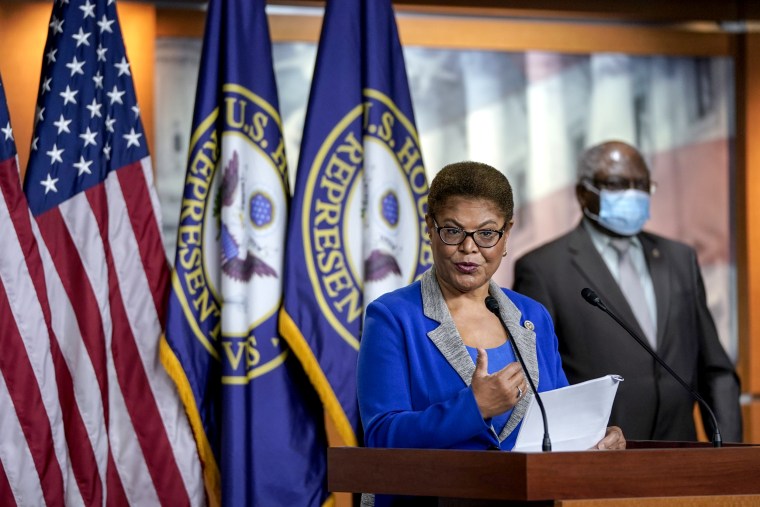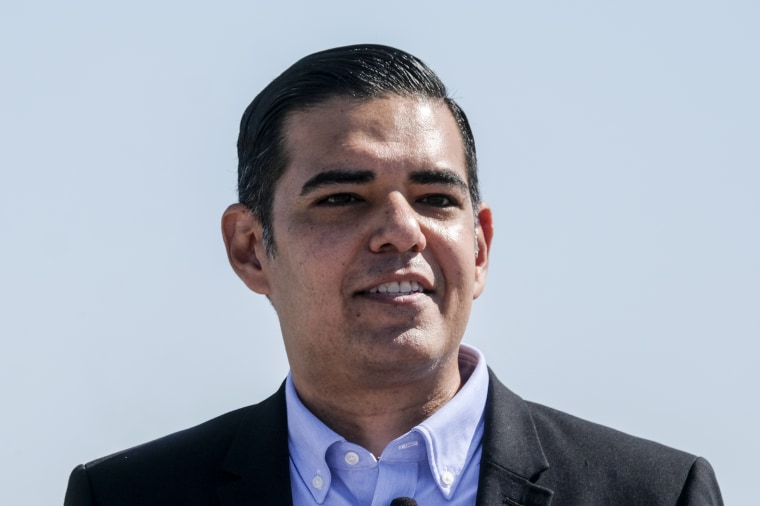LOS ANGELES — Robert Garcia remembers watching on television as then-San Francisco Mayor Gavin Newsom ordered the county to issue same-sex marriage licenses in 2004. A young gay man in his 20s at the time, Garcia called it a "light switch" that ignited his passion for public service.
Now, Garcia, 43, mayor of Long Beach, California, is one of four people Newsom, now the governor, is weighing to serve in the Senate when Vice President-elect Kamala Harris vacates her seat in January.
“It inspired me to step forward, to support groups that are being marginalized,” said Garcia, who is considered the dark horse contender for the nomination.
The front-runner is California Secretary of State Alex Padilla. Also being considered are Reps. Barbara Lee and Karen Bass, both Black women serving in the U.S. House.
Padilla is seen by many Democrats in the state as a shoe-in because of his decadeslong personal relationship with Newsom. The state’s other senator, Dianne Feinstein, has publicly endorsed Padilla. If selected, Garcia or Padilla would be California’s first Latino senator in a state where Hispanics are nearly half the population.
In a recent poll by the University of Southern California Schwarzenegger Institute, 76 percent of respondents said they are looking for a “fresh and new voice” to replace Harris and serve alongside Feinstein, the oldest sitting senator. When asked about each candidate individually, 57 percent of respondents said they would support Garcia, 53 percent said the same of Bass and Padilla and 51 percent said as much about Lee.
When Harris leaves the Senate, the chamber will be without a Black woman. Some advocates are urging the governor to select another Black woman to fill her seat to ensure the Senate isn’t without.
“Zero is unacceptable,” a coalition of civil rights leaders said in a recent letter to Newsom.
Others have also pressed for the governor to pick an Asian American person for the role, citing Harris’ bicultural roots that include a Jamaican father and an Indian mother.
There are just three Asians, three Blacks and four Latinos in the Senate.
“Black women are tired of getting publicly thanked and having nothing to show for it,” said Molly Watson from Let’s Keep the Seat, which is advocating for a Black woman to replace Harris. “For us to lose this seat would be heartbreaking.”
'Reflective of the country'
Garcia, who emigrated from Peru with his parents when he was 5 years old and is now mayor a coastal port city of more than 463,000 residents located south of Los Angeles, would check off several firsts for California if chosen to succeed Harris. Not only would he be the state’s first Latino senator, he would also be the first openly gay person to represent California in the Senate and, at 43, one of the youngest. Sen. Tammy Baldwin, D-Wis., was the first openly gay person elected to the Senate.
“What people really want in California and across the country is for our Congress to be reflective of the country we live in, and that’s a good thing,” Garcia said. “I will support whoever the governor selects. I think he’s going to make a great choice.”
Garcia's rise to the national stage began earlier this year when he was featured as one of “17 rising stars” during the virtual Democratic National Convention. In his DNC address, Garcia described experiencing financial insecurity in his youth and struggling to pay student loan debts.
Since then, he has become a regular presence on the cable news networks, discussing both federal and local responses to the coronavirus pandemic and criticizing President Donald Trump.
Garcia has also talked publicly about his mother, Gaby O’Donnell, a health care worker who died earlier this year from Covid-19. One day after her memorial service, O’Donnell’s husband of 27 years, Greg O’Donnell, also died from the coronavirus.
“There is no question that it has been hard,” Garcia said of losing his mother and stepfather. “I also feel a strong sense of purpose to do the right thing and, through the work we’re doing, save as many lives as possible.”
While considered the least likely pick, he has his supporters.
“I think Robert Garcia would be amazing,” said former California state Sen. Dean Florez. “If the governor is looking for somebody from the local government level, he would certainly be at the top of the list. He’s a dynamic and engaging person.”
'The critical center'
But, Florez said, Newsom might also be looking for someone with institutional knowledge of how California politics works, and for that, his pick would be Padilla, the secretary of state.
“He’s already been elected statewide,” Florez said. “Padilla is a moderate. The people who do get elected statewide, I don’t see them as far left of the party. California is always looking towards the critical center.”
Padilla, 47, has already received strong endorsements from Latino community leaders and from Feinstein, who told NBC News earlier this month that she has already expressed her preference to the governor.
"I know him. And my sense is that he's going to represent California very well,” she said. “He's someone I'd be very happy to work with and also bring Hispanic representation to the Senate for the first time.”
As California’s top election official, Padilla is an outspoken advocate for improving election security and combating disinformation. In the 2020 election, he oversaw universal mail-in voting for a state with 22 million registered voters.
As a result of outreach campaigns, 88 percent of eligible Californians were registered to vote by October, according to Padilla’s office.
Before becoming secretary of state, Padilla was an L.A. city council member and state senator. He was inspired to run for elected office in the wake of California's anti-immigration policies of the 1990s, including a now-infamous ballot measure that would have denied immigrants without legal standing access to health care and public education. In 1999, at the age of 26, he became a council member for California's largest city.
“From a historical perspective, Latinos do deserve a Latino senator, and this might be the way to ignite that,” Florez said. “Padilla has been building up to this moment.”
'We've seen her stand up'
Lee is a favorite for progressives hoping to see at least one Black woman in the Senate.
She has steadily built her progressive credentials, including recently authoring the MORE Act, which would federally decriminalize cannabis and create pathways for federal criminal record expungements. The bill passed the House this month, a first for efforts to decriminalize marijuana, but stands no chance in the current Senate.
“Remember, Bernie [Sanders] won the state,” said Watson, from Let’s Keep the Seat, arguing that California Democrats are liberal, not moderate.
Lee, 74, represents a Northern California congressional district that includes the cities of Oakland and Berkeley.

She was born in El Paso, Texas, but moved to California with her family as a child and later worked with a local chapter of the NAACP to integrate her high school cheerleading squad. Her first job in politics was working on the presidential campaign of Rep. Shirley Chisholm, the first Black woman elected to Congress.
“We’ve seen her stand up as a Black woman,” Watson said. “She’s a champion of LGBTQ issues and anti-war. The progressive community really comes together under Barbara Lee.”
'Connected to the community'
Bass, who represents portions of Los Angeles, also has her advocates. They point to her congressional track record tackling issues related to racial equality and her background in community organizing.
As chair of the Congressional Black Caucus, Bass, 67, recently teamed up with senators Harris and Cory Booker, D-N.J., to introduce the Justice in Policing Act in the wake of George Floyd’s killing in Minneapolis police custody earlier this year. Floyd’s death sparked nationwide protests and inspired legislation at the national and local levels to address police brutality and systemic racism.

The bill passed in the House but has yet to pass in the Republican-controlled Senate. It would ban police from using chokeholds, eliminate qualified immunity, establish national policing standards and streamline federal laws to prosecute excessive force cases against law enforcement officers.
She has also introduced and sponsored legislation to implement grant funding for community-based nonprofits that operate re-entry programs, extend foster care benefits for youth who would age out of the system during the pandemic and create a national standard of care for incarcerated pregnant women.
“This is a woman who has remained connected to the community,” Watson said. “She has done nothing but serve.”

